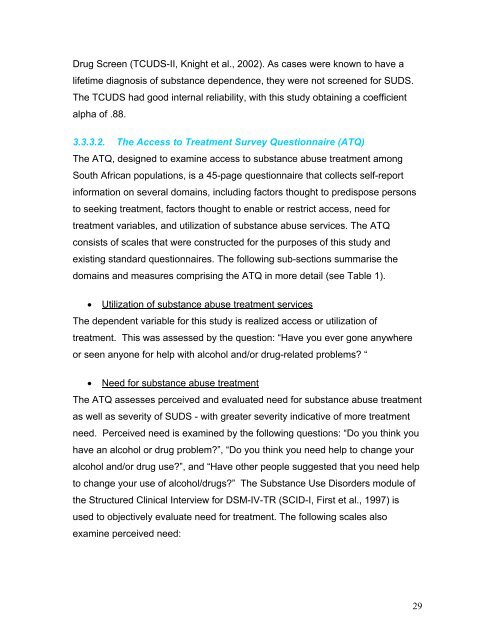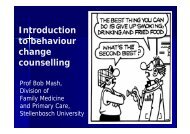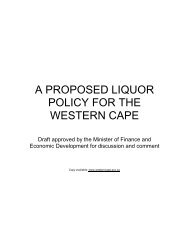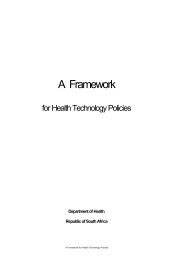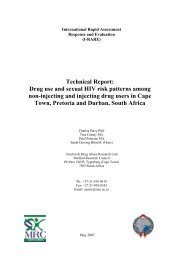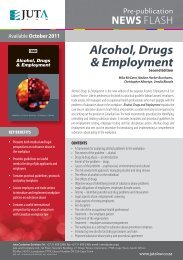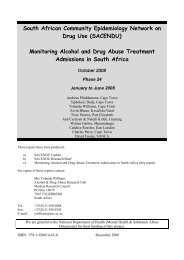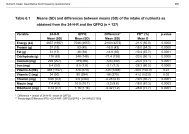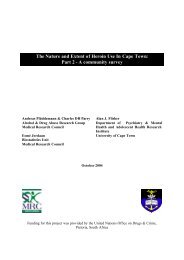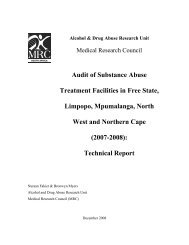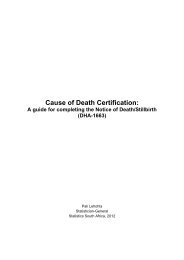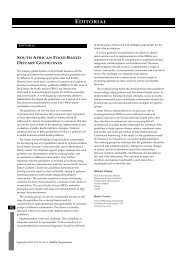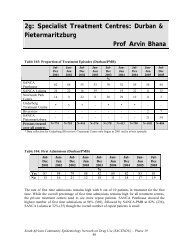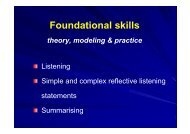Access to substance abuse treatment in the Cape Town metropole ...
Access to substance abuse treatment in the Cape Town metropole ...
Access to substance abuse treatment in the Cape Town metropole ...
You also want an ePaper? Increase the reach of your titles
YUMPU automatically turns print PDFs into web optimized ePapers that Google loves.
Drug Screen (TCUDS-II, Knight et al., 2002). As cases were known <strong>to</strong> have alifetime diagnosis of <strong>substance</strong> dependence, <strong>the</strong>y were not screened for SUDS.The TCUDS had good <strong>in</strong>ternal reliability, with this study obta<strong>in</strong><strong>in</strong>g a coefficientalpha of .88.3.3.3.2. The <strong>Access</strong> <strong>to</strong> Treatment Survey Questionnaire (ATQ)The ATQ, designed <strong>to</strong> exam<strong>in</strong>e access <strong>to</strong> <strong>substance</strong> <strong>abuse</strong> <strong>treatment</strong> amongSouth African populations, is a 45-page questionnaire that collects self-report<strong>in</strong>formation on several doma<strong>in</strong>s, <strong>in</strong>clud<strong>in</strong>g fac<strong>to</strong>rs thought <strong>to</strong> predispose persons<strong>to</strong> seek<strong>in</strong>g <strong>treatment</strong>, fac<strong>to</strong>rs thought <strong>to</strong> enable or restrict access, need for<strong>treatment</strong> variables, and utilization of <strong>substance</strong> <strong>abuse</strong> services. The ATQconsists of scales that were constructed for <strong>the</strong> purposes of this study andexist<strong>in</strong>g standard questionnaires. The follow<strong>in</strong>g sub-sections summarise <strong>the</strong>doma<strong>in</strong>s and measures compris<strong>in</strong>g <strong>the</strong> ATQ <strong>in</strong> more detail (see Table 1).• Utilization of <strong>substance</strong> <strong>abuse</strong> <strong>treatment</strong> servicesThe dependent variable for this study is realized access or utilization of<strong>treatment</strong>. This was assessed by <strong>the</strong> question: “Have you ever gone anywhereor seen anyone for help with alcohol and/or drug-related problems? “• Need for <strong>substance</strong> <strong>abuse</strong> <strong>treatment</strong>The ATQ assesses perceived and evaluated need for <strong>substance</strong> <strong>abuse</strong> <strong>treatment</strong>as well as severity of SUDS - with greater severity <strong>in</strong>dicative of more <strong>treatment</strong>need. Perceived need is exam<strong>in</strong>ed by <strong>the</strong> follow<strong>in</strong>g questions: “Do you th<strong>in</strong>k youhave an alcohol or drug problem?”, “Do you th<strong>in</strong>k you need help <strong>to</strong> change youralcohol and/or drug use?”, and “Have o<strong>the</strong>r people suggested that you need help<strong>to</strong> change your use of alcohol/drugs?” The Substance Use Disorders module of<strong>the</strong> Structured Cl<strong>in</strong>ical Interview for DSM-IV-TR (SCID-I, First et al., 1997) isused <strong>to</strong> objectively evaluate need for <strong>treatment</strong>. The follow<strong>in</strong>g scales alsoexam<strong>in</strong>e perceived need:29


